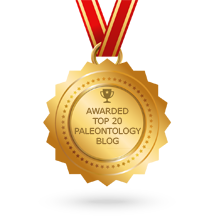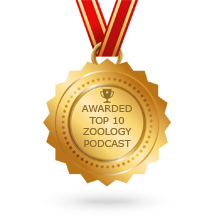Browsing the "Mesozoic" Category
The Mesozoic era, meaning “middle life”, is a division of earth’s history spanning from around 252 to 66 million years ago. It is subdivided into the Triassic, Jurassic and Cretaceous periods. The beginning of the Mesozoic is characterised by a long phase of recovery following the end Permian mass extinction. The end of the Mesozoic is marked by the Cretaceous/Paleogene extinction event which wiped out the dinosaurs among other groups.

Published on November 2nd, 2015 | by Liz Martin-Silverstone
For some time now, we’ve known that most (if not all) theropod dinosaurs were feathered, but we’re still filling in the blanks of feather colouration, types of feathers, and how the feathers were distributed on the [&hellip... Read More →

Published on November 1st, 2015 | by Joe Keating
The ‘Crystal Palace Dinosaurs’ are a series of sculptures of extinct animals including dinosaurs, other extinct reptiles and mammals, which can be found in the grounds of the Crystal Palace in London. Commissioned in 1852, these [&hellip... Read More →

Published on October 15th, 2015 | by Liz Martin-Silverstone
Ankylosaurs are a group of non-avian dinosaurs best known for their armour, tank-like bodies, and sometimes large tail clubs. First appearing in the Jurassic, they were common in Late Cretaceous ecosystems, with several species known from [&hellip... Read More →

Published on October 7th, 2015 | by David Marshall
Birds have a long evolutionary history; the earliest of them, the famed Archaeopteryx, lived 150 million years ago in what is today southern Germany. However, whether these early birds were capable of flying and if so, [&hellip... Read More →

Published on September 8th, 2015 | by Liz Martin-Silverstone
Ankylosaurs are the large, tank-like, armoured dinosaurs that often had a large boney club at the end of their tail. The club is formed of osteoderms, dermal bone that has fused together at the end of the [&hellip... Read More →

Published on August 26th, 2015 | by Liz Martin-Silverstone
A new iguanian fossil described in Nature Communications from the Late Cretaceous of Brazil is changing traditional views on early lizard evolution in the southern hemisphere. Lizards are split into two groups: acrodontan lizards (found in [&hellip... Read More →

Published on August 11th, 2015 | by Liz Martin-Silverstone
A new study out today looks at the question of whether or not geographically widespread species are less likely to become extinct, using the Triassic-Jurassic boundary extinction event. Alex Dunhill from the University of Leeds had [&hellip... Read More →

Published on July 28th, 2015 | by Liz Martin-Silverstone
A new study out today has looked at the tooth development of theropod dinosaurs and found they had a novel morphology of the serrated teeth. Lead author Kirstin Brink of the University of Toronto had this [&hellip... Read More →

Published on July 16th, 2015 | by Liz Martin-Silverstone
Another new feathered dinosaur has been described today from the Early Cretaceous of China. Zhenyuanlong joins the ever expanding list of feathered theropods from this region, and has implications for the evolution of wings in dinosaurs. We [&hellip... Read More →

Published on July 8th, 2015 | by Liz Martin-Silverstone
Today, a new ceratopsian was named, Wendiceratops pinhornensis. While known to the public for sometime, it has now been officially named and described. It is an important find illuminating ceratopsian and centrosaurine evolution in North America. We spoke [&hellip... Read More →






















